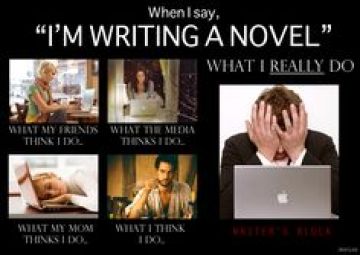
There are books on the process of writing a novel. Entire websites are dedicated to the subject. And none of them suggest doing it the way I’m about to demonstrate.
As I move through the process, the reason for that will become abundantly clear. In fact, multiple reasons for avoiding my novel way of writing a novel will flash like neon warnings.
But did that stop me?
And it begins
I’ve been working on a short story project since March. I’ve alluded to it several times in posts here or updates on Facebook.
However, even though I have a signed contract, I was sworn to secrecy. It was my Top Secret project.
As I pen these words, I still haven’t been given the go ahead to announce the project or my participation therein. What was supposed to have an October 2015 publishing date has been pushed back to February 2016.
The repercussions of a story I wrote specifically to submit to this secret project ring like aftershocks in my writing world.
It all began with a line from an email:
“Last, but not least, the publisher is curious as to whether you’d be interested in developing The Demon Was Me into a full novel! (Way to go, Sharon!)”
In a world where I sent queries into the depths of cyberspace, pleading for a chance to send my fully written, revised, edited and proofed novel for their reading enjoyment, that simple sentence knocked me for a loop.
And there were expectations
I would have been crazy to shrug off this opportunity. So, I sent a cautious reply to my editor.
 And the email correspondence continued for another week.
And the email correspondence continued for another week.
What the publisher wanted, however, wasn’t a novel – or even the outline of a story. These were the specifications for what she wanted:
“To retain threads of time, theme, characters in the short story and throw out ideas that can be explored further” in a novel-length work.
Does anyone go about building a story this way?
Isn’t the seed usually for a premise or concept, or maybe a character or problem?
And there were plenty of lee lines hanging around in my short story. In fact, my main character had something like a heavenly directive given to him in the resolution of the 9000-word experience (otherwise known as short fiction).
So, rather than outlining his complete story, I was supposed to brainstorm possibilities for what happened afterward.
Yeah, I scribbled out three full notebook pages without pause.
But how can I organize these tidbits into something compelling enough to convince this publisher she wants the story?
And deadlines
The initial deadline to share my visions of where the story might go (after it ends in the short story bought and to-be-published) was given.
“The publisher would love to have a 10-point outline from you by October 1.”
More gaping.
I have an idea factory inside my brain. Every fiction writer I know has something similar. The slightest thing becomes a seed for a full-blown tale.
The same was true for the universe I imagined in detail as the setting of this short story.
So the scribbles continued. First, I guessed I had enough for a four-book series. On closer thought, I condensed it into a trilogy.
But the stakes and the ticking clock needed for the first installment still seemed a little week.
And wait! Am I even supposed to be planning this stuff?
The ten points that are due …the clock is ticking on that…don’t have to outline a complete story.
Shouldn’t I have sighed with relief? Instead, frustration mounted.
I seriously didn’t know how to pitch on incomplete story idea. Should I focus on a few premises? Let the publisher take her pick?
And brainstorming sessions
 Those original three handwritten pages were a drop in the bucket.
Those original three handwritten pages were a drop in the bucket.
I expanded the 500-word history I’d written for my setting into a nearly 3000-word history. I laid out the different sub-sections of the war-torn country. I gave each of them inhabitants and a governing style and leaders.
Now there were people for my hero to meet on his journey.
And so I filled more notebook pages with descriptions of the people and their problems. I listed possible conflicts that would arise when my hero encountered those systems.
And it still looks like a trilogy in the making or one FAT novel (not the preference for YA readers).
But I didn’t know what to include in the requested outline. So I called on my fabulous editor.
And waiting
When it was all said and done, written down in sparkling clean fashion and emailed to the publisher, the waiting began.
Again.
Sometimes it feels like writing is more about waiting than it is about transcribing pretty words on a page to form cool adventures.
Are you writing a novel? If you’re nodding yes, don’t follow this plan. Seriously.

Exciting!
Deborah-
Even more exciting if they offer me a contract. Of course, praying for God’s will in the matter rather than my own (which is easy to say and not as easy to do).
Sharon
Ain’t that the truth!
Pingback: My Exciting Announcement – Sharon Lee Hughson, Author
Pingback: Author Interviewed: It’s ME! – Sharon Lee Hughson, Author